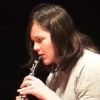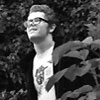Recipients
Samantha Owens (2025)
The Lilburn Research Fellowship for 2025 was awarded to Samantha Owens.
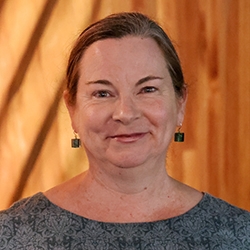 Music scholar Professor Samantha Owens has been awarded the prestigious Lilburn Research Fellowship for 2025. Professor Owens will use the Fellowship to research and write a book on the history of brass bands in Aotearoa New Zealand from 1842 to 1920, while being based at the National Library of New Zealand Te Puna Mātauranga o Aotearoa.
Music scholar Professor Samantha Owens has been awarded the prestigious Lilburn Research Fellowship for 2025. Professor Owens will use the Fellowship to research and write a book on the history of brass bands in Aotearoa New Zealand from 1842 to 1920, while being based at the National Library of New Zealand Te Puna Mātauranga o Aotearoa.
“Often referred to as the ‘working man’s symphony orchestra,’ these bands played a key role in the country’s popular music culture for both Māori and Pākehā, women and men,” she observes.
Her project ‘Parading Communities’ will consider bands as a musical focus for a diverse range of groups including military regiments, workers, civic groups, religious denominations, and Māori communities.
Based in Wellington, Professor Owens is a highly respected musicologist who holds the position of Honorary Professor of Music at the University of Queensland. Widely published, her research has covered various topics including music in colonial New Zealand and the European Baroque period. She is thrilled and honoured to be taking up the Lilburn Research Fellow for 2025. “It’s wonderful to be able to dedicate a whole year to researching and writing a book. Such opportunities are incredibly rare for New Zealand-based music historians. “The National Library and the Alexander Turnbull Library hold a wealth of directly relevant source material — including the papers of the Brass Band Association of New Zealand and an amazingly rich collection of historic concert programmes and photographs. Being based there will benefit my research enormously.”
Professor Owens will receive a $70,000 stipend, an office at the National Library of New Zealand Te Puna Mātauranga o Aotearoa, and access to its collections. The author and editor of several books, including the forthcoming Music in Colonial New Zealand Cities (co-edited with Kirstine Moffat), Professor Owens’ writing on New Zealand music has included studies of German travelling bands and choral music. She is also an experienced musician, holding a Bachelor of Music in Oboe performance, as well as receiving her Licentiate from Trinity College, London.
In July 2024, RNZ Concert's David Morriss interviewed Professor Owens about the upcoming fellowship. Listen to the interview here.
Photo credit: Miro King, Te Tari Taiwhenua Department of Internal Affairs
Nick Bollinger (2023)
The Lilburn Research Fellowship for 2023 was awarded to Nick Bollinger.
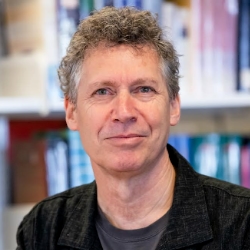 Writer, musician, and broadcaster Nick Bollinger has been awarded the Lilburn Research Fellowship for 2023.
Writer, musician, and broadcaster Nick Bollinger has been awarded the Lilburn Research Fellowship for 2023.
Mr Bollinger will use the Fellowship to research and write a book on culture, class and identity in New Zealand music, while being based at the National Library of New Zealand Te Puna Mātauranga o Aotearoa. Exploring historic thinking on the subject, from composer Douglas Lilburn’s cultural nationalism to Lorde's assertion that 'pop can unite populations', the book will ask: 'What happens to notions of musical identity in our hyper-connected 21st century?' Areas to be considered include Māori showbands, electronic music, taonga puoro (traditional Māori musical instruments), and visits by international artists, such as Bob Marley.
Author of the books Goneville: A Memoir, How to Listen to Pop Music and 100 Essential New Zealand Albums, Mr Bollinger is widely known as a music reviewer and journalist for national and international media outlets and publications. He says being appointed the Lilburn Research Fellow for 2023 is an honour and a fantastic opportunity.
"Being the Lilburn Fellow will give me the time to examine in-depth ideas about music and New Zealand life that I’ve only been able to touch on in my previous work. It will also enable me to dig deep into the relevant archives.
"The National Library and Alexander Turnbull Library collections are a goldmine for a cultural researcher. Being based at the National Library will be like living amongst the treasures."
Mr Bollinger's work in the music field has been wide-ranging, including editing Real Groove Magazine, presenting the weekly RNZ review programme The Sampler and writing for the New Zealand music history website AudioCulture. He received the 2019 Friends of the Turnbull Library research grant and 2021 J.D. Stout Fellowship in New Zealand Studies to write the book Jumping Sundays: The Rise and Fall of the Counterculture in Aotearoa New Zealand, which was the winner of the Ockham Book Award, 2023 for illustrated Non-Fiction. Mr Bollinger is also an experienced musician, including as a member of the groups Rough Justice, The Pelicans and the Windy City Strugglers.
Photo credit: Mark Beatty, National Library of New Zealand
Dr Anton Killin (2021)
The Lilburn Research Fellowship for 2021 was awarded to Dr Anton Killin.
 Dr Anton Killin took up the Fellowship in 2021 to further his study "Indonesian gamelan in New Zealand composition." His research focused on cross-cultural music composition in New Zealand relating to use of gamelan, a traditional ensemble music of Indonesia. Gamelan has been a significant cultural influence on New Zealand composers since it was introduced here in the 1970s.
Dr Anton Killin took up the Fellowship in 2021 to further his study "Indonesian gamelan in New Zealand composition." His research focused on cross-cultural music composition in New Zealand relating to use of gamelan, a traditional ensemble music of Indonesia. Gamelan has been a significant cultural influence on New Zealand composers since it was introduced here in the 1970s.
Dr Killin studied music composition and philosophy at Victoria University of Wellington, with cross-cultural music being the focus of much of his subsequent research. Since being awarded his doctorate in 2017, he has held post-doctoral fellowships in Australia, USA, and Canada.
In response to being awarded the 2021 Lilburn Research Fellowship, Dr Killin was excited and honoured. "Indonesian gamelan music has been and continues to be a significant source of non-Western musical influence for generations of New Zealand composers, from Douglas Lilburn and Jack Body to emerging composers today. This research project aims to provide an account of this influence, with which I hope to benefit both contemporary New Zealand music studies and cross-cultural philosophical aesthetics, as well as promote gamelan music itself," he says.
Gamelan first arrived in New Zealand in 1975 when Allan Thomas imported a set of instruments from Java to Victoria University of Wellington to support ethnomusicology teaching with a performing ensemble soon being formed. There are now ensembles based around the country. Composers who were subsequently inspired to write works for gamelan include David Farquhar, Jack Body, Gareth Farr, John Psathas, Helen Bowater, and Juliet Palmer.
"An exciting aspect of Anton's research is that he will be investigating a number of rich collections in the Turnbull Library's Archive of New Zealand Music", says Dr Michael Brown, Music Curator, Alexander Turnbull Library. "These include the manuscript scores of a number of eminent composers, the RNZ New Zealand Composer Sound Archive and related material in the collections of Allan Thomas and the late Jack Body."
Daniel Beban (2019)
The Lilburn Research Fellowship for 2019 was awarded to Daniel Beban.
 Daniel Beban took up the Fellowship in 2019 to further a study of the Braille Collective musicians in Wellington. The Collective made up groups such as the Six Volts and Primitive Art Group in the mid-1980s.
Daniel Beban took up the Fellowship in 2019 to further a study of the Braille Collective musicians in Wellington. The Collective made up groups such as the Six Volts and Primitive Art Group in the mid-1980s.
Mr Beban studied ethnomusicology and composition at Victoria University of Wellington, with improvised and experimental music being the focus of much of his subsequent research, writing and radio broadcasting work.
Mr Beban says that he feels honoured to be awarded the 2019 Lilburn Research Fellowship. "This is a fantastic opportunity to produce a book about the Braille Collective and New Zealand improvised music from the late '70s onwards. It's an important story in the history of New Zealand music, and as most of the musicians involved in this community have operated outside of institutions, it is a piece of history that has been largely overlooked. It is a great privilege that I am able to devote a substantial period of time to helping tell their story," he says.
The Braille Collective embraced a self-publishing and DIY approach, releasing music on their own record label and creating much of their own promotional artwork. Its members have gone on to contribute significantly to New Zealand's wider music scene and internationally.
The Alexander Turnbull Library's Music Curator, Dr Michael Brown, says that the Lilburn Research Fellowship was established as a biennial award in 2012 to encourage scholarly research about New Zealand music. "This is the only fellowship available in New Zealand that specifically supports New Zealand music research, and it means that Daniel will receive a $70,000 grant, an office at the National Library and access to our collections. It's one of the most significant fellowships awarded by the National Library of New Zealand Te Puna Mātauranga o Aotearoa (NLNZ)," he says.
"One of the exciting aspects of Daniel's research is that he will be delving deeply into the fantastic collections of the Archive of New Zealand Music", Dr Brown says. "These include numerous live recordings of Braille Collective groups, and related material in the collections of composers Jonathan Besser and the late Jack Body." It is especially pleasing to be able to announce the recipient during May, New Zealand Music Month, Dr Brown says. "The Alexander Turnbull Library's world-class collections help preserve New Zealand's significant original music heritage, such as magnetic tapes and other original recordings, musical scores, photographs, and posters. The legacy of the Library’s generous donors is underlined by research such as Daniel's."
Photo credit: Mark Beatty, National Library of New Zealand
Aleisha Ward (2017)
The Lilburn Research Fellowship for 2017 was awarded to Dr Aleisha Ward.
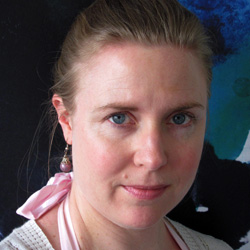 Aleisha Ward used the fellowship to research the musical and cultural history of New Zealand’s jazz age (1917-1929) in a project called The Jazz Age in New Zealand.
Aleisha Ward used the fellowship to research the musical and cultural history of New Zealand’s jazz age (1917-1929) in a project called The Jazz Age in New Zealand.
"I feel incredibly honoured to be selected as the 2017 Lilburn Research Fellow. This makes it possible for me to expand to a national scale the research I am doing. I am delighted to have this opportunity to explore and share with others the vibrant and exciting jazz, dance, music and entertainment scene of 1920s New Zealand, and tell the story of how jazz in all its guises infiltrated and affected the formation of modern New Zealand culture," Dr Ward said.
"The composer Douglas Lilburn's manifestos on searching for tradition and language resonate not only in New Zealand art music history, but also in our jazz history. The arguments that Lilburn made for New Zealand artists to find our own traditions and musical languages that align with, but are separate from, the northern hemisphere have been explored by our jazz and dance musicians since the early 1920s."
Dr Ward holds a PhD in Music from the University of Auckland, an MA in Jazz History and Research from Rutgers University, New Jersey, and was the 2016/2017 Sir George Grey Researcher in Residence at Auckland Libraries. Dr Ward spent much of 2017 based at the National Library in Wellington, but also used the fellowship as an opportunity to examine archival holdings in other institutions in New Zealand and Australia.
"The Archive of New Zealand Music holds extensive collections relating to jazz in New Zealand including the Dennis Huggard Jazz Archive and the papers of New Zealand's foremost jazz broadcaster of the mid-twentieth century, Arthur Pearce," said Alexander Turnbull Library Curator Music Michael Brown. “These and other collections will provide rich resources for Dr Ward's project."
Photo credit: (supplied)
Chris Bourke (2015)
The Lilburn Research Fellowship for 2015 was awarded to Wellington writer and radio producer Chris Bourke.
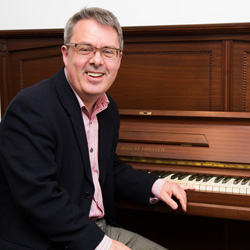 Chris Bourke's book Blue Smoke: the Lost Dawn of New Zealand Popular Music, 1918-1964, published in 2010 by Auckland University Press, won the 2011 New Zealand Post Book Awards for "book of the year", "general non-fiction" and "people's choice".
Chris Bourke's book Blue Smoke: the Lost Dawn of New Zealand Popular Music, 1918-1964, published in 2010 by Auckland University Press, won the 2011 New Zealand Post Book Awards for "book of the year", "general non-fiction" and "people's choice".
He was National Library Research Fellow in 2006 and University of Waikato Writer-in-residence in 2008. As well as writing for the New Zealand Listener, Pacific Wave, Rip It Up, Real Groove, North and South, and Music in New Zealand, Bourke has also produced Saturday Morning on National Radio with hosts John Campbell and Kim Hill.
Roger Smith of the Music Advisory Committee for the Lilburn Trust said, "Chris Bourke's application is very strong and highly topical. It is timely and will reach out to a lot of people." As the Lilburn Research Fellow Chris Bourke will work on an introductory companion book to Blue Smoke that will be about New Zealand music during the First World War. His research will be greatly assisted by the New Zealand WWI Sheet music that has recently been digitized by the Turnbull Library.
"It is a great honour to be selected as the 2015 Lilburn Research Fellow," said Bourke. "Lilburn's presence at Victoria University while I was there stimulated an interest in New Zealand's musical heritage, and his generosity creating the Archive of New Zealand Music at the Turnbull Library can now be seen as visionary as his compositions. He took an interest in all the arts, and all kinds of music. Next year is the centenary of Lilburn's birth and New Zealand's participation at Gallipoli, so this book will be a tribute to both."
Photo credit: Mark Beatty, National Library of New Zealand
Philip Norman (2013)
The inaugural Lilburn Research Fellowship for 2013 was awarded to Dr Philip Norman of Christchurch.
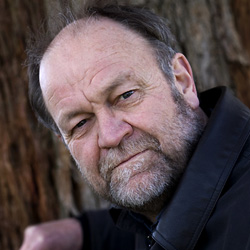 Philip Norman is well known as a composer, music publisher and writer, and he has been the recipient of many awards including a citation from the Composers Association of New Zealand, a New Zealand 1990 Commemoration Medal, and the Friends of the Turnbull Library inaugural Research Grant.
Philip Norman is well known as a composer, music publisher and writer, and he has been the recipient of many awards including a citation from the Composers Association of New Zealand, a New Zealand 1990 Commemoration Medal, and the Friends of the Turnbull Library inaugural Research Grant.
His biography, Douglas Lilburn: His Life and Music, published in 2006 by Canterbury University Press, won the biography category of the 2007 Montana Book Awards.
During his year as the Lilburn Research Fellow, Philip Norman worked towards completing a book that charts the course of New Zealand composition from the beginnings of European settlement through to the 21st century.
Photo credit: Gareth Watkins


